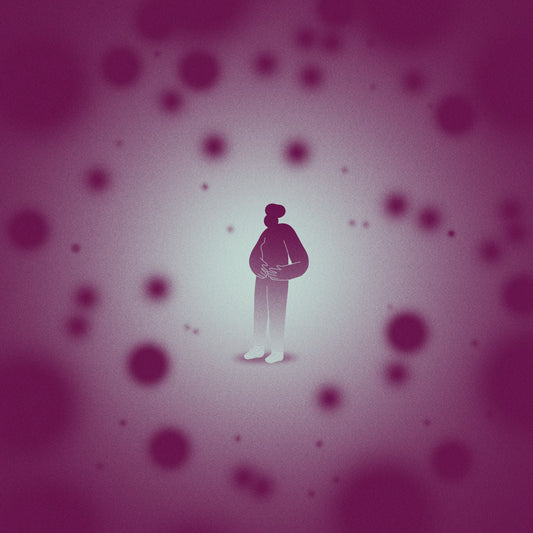Many women still dismiss menopause as something that will just happen in their fifties - but we need to be prepared. Despite “menopause” being used to describe the entire experience, menopause itself is really just a day that marks the 12 month anniversary after having your last period.
Being armed with the knowledge of what to look out for when it comes to the three stages of menopause, common symptoms, and knowing when to talk to a doctor, is extremely useful. Intimate women’s health expert, Dr Shirin Lakhani, gave us the lowdown on everything there is to know about menopause symptoms.
What are the common symptoms of menopause?
Hormones help regulate many of our bodily functions, including metabolism, stress, hunger, and sex drive. So, when their balance is shifted, your body, and mind, can feel really different, and be impacted in a number of ways.
“There are many symptoms for the menopause, but there are some key signs,” says intimate women’s health expert Dr Shirin Lakhani.
- Hot flashes and night sweats
- Difficulty concentrating
- Nausea
- Joint aches
- Memory loss
- Palpitations
- Reduced libido
- A change in the normal pattern of periods
- Difficulty sleeping
- Reduced muscle mass
- Recurrent urinary tract infections
“It is important to look at all of a woman’s symptoms holistically,” says Dr Lakhani.
Sometimes a woman may not think something is even a symptom of menopause, such as Gluteal Tendinopthy, which is pain on the outer sides of the hips.
While blood tests are not required, doctors can run blood or urine tests or salivary tests to determine levels of the hormones estradiol, follicle-stimulating hormone (FSH), and luteinizing hormone (LH). Doctors can also measure testosterone, progesterone and cortisone levels as they can all have an effect on symptoms.
“During the menopause, the ovaries become less responsive to FSH and LH hormones, so the body makes more of these hormones to compensate. Estradiol and other hormones decrease around menopause as well so these levels can be an indication of menopause,” says Dr Lakhani.
In addition to the characteristic hot flash that is associated with menopause, there are many related symptoms that can have a significant impact on a person’s quality of life, such as nausea, joint aches, an increase in allergies, memory loss and palpitations, to name but a few. The lack of awareness regarding menopausal symptomatology may result in needless anxiety for patients and a feeling of helplessness. Early symptoms can also include a reduced libido and difficulty concentrating.
The other stages of menopause and their symptoms
“There are three stages of menopause: perimenopause, menopause and postmenopause,” says Dr Lakhani.
Perimenopause is the transitional period before menopause. During perimenopause, levels of oestrogen start to decrease. Menopause-like symptoms may start, such as hot flashes or irregular periods. Perimenopause can last for years. When you go a full 12 months without a period, menopause has begun. It can start in your 30s, but is most common between the ages of 40 and 50.
“Early menopause means you really need to see a health professional as the lack of oestrogen will have a major effect on your body,” says Dr Lakhani. This is because of the increased risk of developing osteoporosis or heart disease, which in turn may lead to early death.
“Postmenopause is the period after menopause has occurred. Once this happens, you're in postmenopause for the rest of your life,” explains Dr Lakhani. People in postmenopause are at an increased risk for certain health conditions like osteoporosis and heart disease and you can’t get pregnant because your ovaries have stopped releasing eggs.
How these symptoms can affect your life
The consequences of the menopause can be challenging – one in four women will experience debilitating symptoms, such as hot flashes, that can last over 10 years all in all. But, some others will not feel the symptoms nearly as tough–it totally depends on individual biology.
“Perimenopause can feel really isolating and debilitating,” says Dr Lakhani. She recommends sitting down and talking to your loved ones about it and what you might be going through. It might help to tell them you may be moody for ‘no reason’, overreact to something seemingly small, or suffer from brain fog. Having your loved ones around to support you is really important.
Managing symptoms
“I strongly advise taking Hormone Replacement Therapy (HRT) if a woman is suitable for it,” says Dr Lakhani. “Women often suffer with symptoms for years but do nothing about it.
Often women are prescribed antidepressants instead of HRT. Doctors don’t always focus on the benefits of HRT, which are plentiful - from preventing heart disease, osteoporosis and dementia, which are all linked to low oestrogen.
There are a wide range of treatments out there to help with the symptoms of menopause,” said Dr Lakhani.
Menopause can really affect sleep too. For a good night's sleep, you need good sleep hygiene so don't go on your phone, read a book, try to relax before going to bed, avoid caffeine later in the day, and avoid alcohol as it can exacerbate palpitations and sweats.
"Try using natural sleep aids such as herbal sleeping aids,'' says Dr Lakhani. I take melatonin, which helps me get to sleep and I am on progesterone as natural progesterone helps you sleep. It relaxes you and calms you.”
Menopause can also cause bloating and weight gain. During menopause, your body goes through huge hormonal changes. It decreases the amount of hormones it makes, particularly oestrogen and progesterone, which are produced by the ovaries.
“Bloating may occur more frequently in perimenopause than during menopause or postmenopause as your hormones are changing rapidly, which can lead to higher levels of oestrogen,'' says Dr Lakhani. Oestrogen causes your body to retain water, which can lead to bloating.”
“For extra lifestyle changes that will help, I would recommend making sure you get lots of rest, including trying to keep to regular sleep routines, even if this is hard when suffering from menopausal insomnia,” says Dr Lakhani. I would also recommend eating a healthy, balanced diet with calcium-rich food to keep bones healthy. Exercising regularly is important in many ways but will help with the menopause. This isn’t only because exercise produces endorphins and can put you in a better mood but also because as your ovaries stop producing oestrogen, it can increase your risk for heart disease, stroke and osteoporosis so exercising will help keep you healthy and active.”























